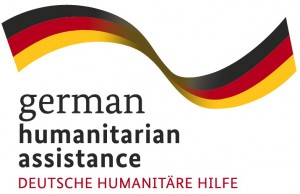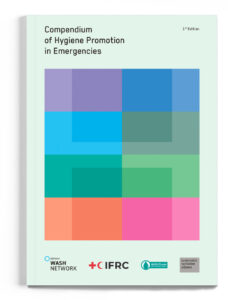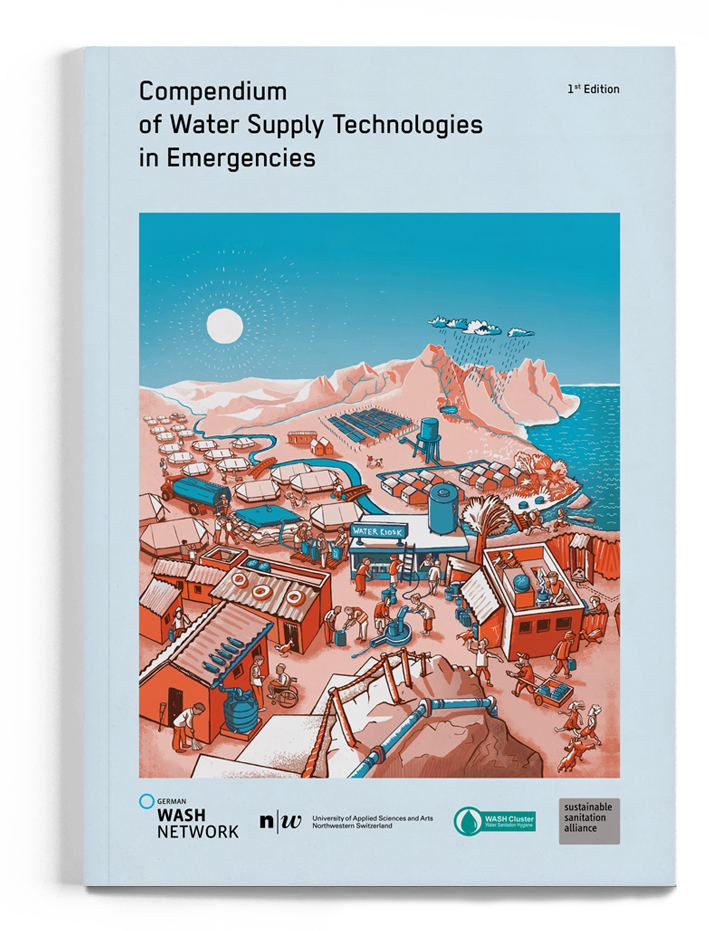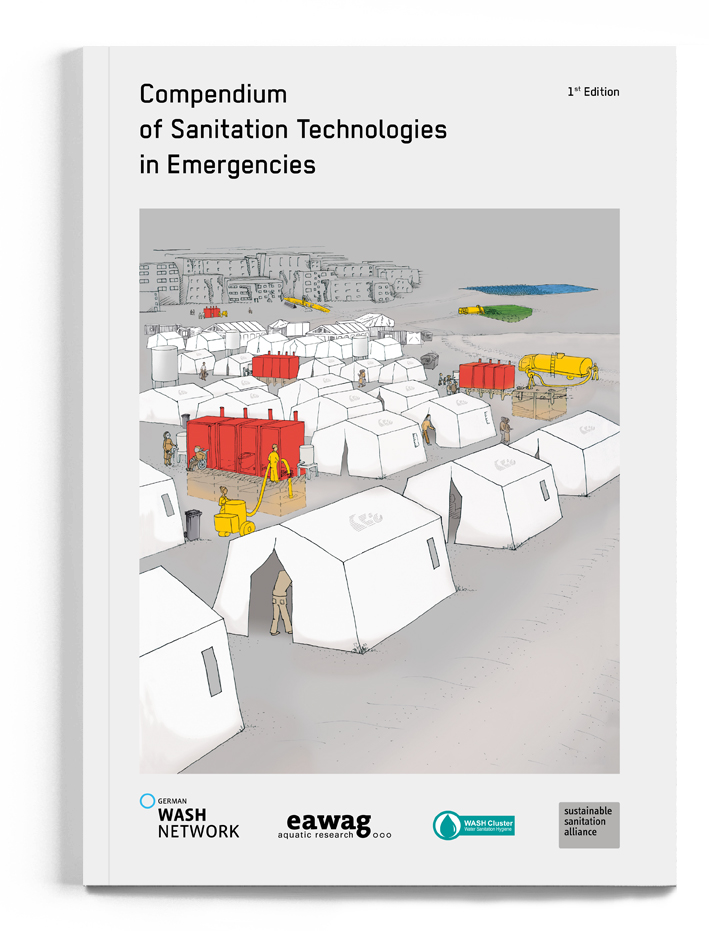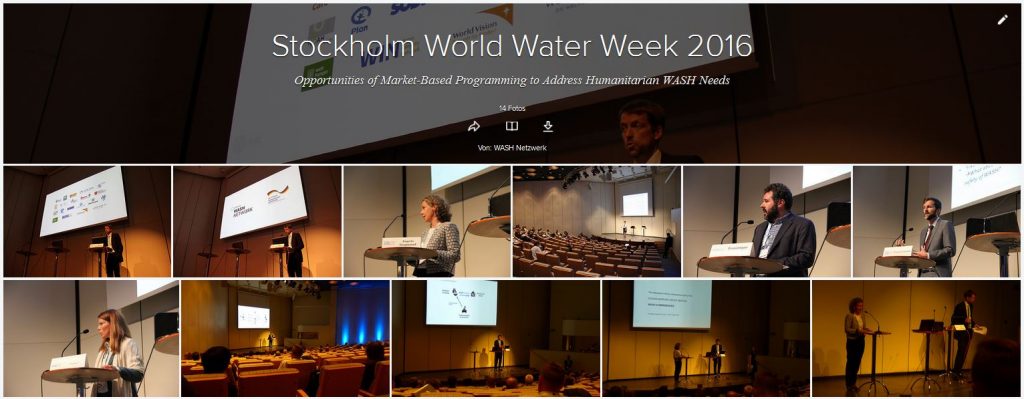Stockholm World Water Week 2016

Event: Opportunities of Market-Based Programming to Address Humanitarian WASH Needs
Humanitarian organisations increasingly view market-based programing (incl. cash-transfer and vouchers) as an effective response to address humanitarian needs of affected people. The humanitarian WASH sector is still in its early stages of integrating market-based programming as a standard practice. In 2015 both the German WASH Network and the Global WASH Cluster identified the need to facilitate a sector-wide dialogue aiming to strengthen the institutional understanding of ‘markets & cash’ and to identify opportunities and the challenges of the new modalities. For this purpose the network decided to provide a platform at the World Water Week in Stockholm. In Stockholm the current status of empirical evidence and ‘good practice’ examples, which are needed to illustrate that market-based programming allows people to adequately cover their WASH needs, were presented.
The event was conducted in close cooperation with the Federal Foreign Office, the Global WASH Cluster, DG ECHO and several other partners. Nearly 100 participants from the UN, donors, NGOs, implementing organizations and companies discussed the opportunities and risks of new market-oriented modalities and prepared recommendations that were incorporated into a new position paper of the Global WASH Cluster.
Please find the event summary on the next page.
Event Summary
Growing humanitarian needs, the proliferation of protracted and complex crises, rapidly changing environments of aid delivery, especially in middle-income countries like in the Middle East, have increasingly triggered discussion on humanitarian aid effectiveness, modalities and program-designs, also discussed at Stockholm WWW in the past years. Along with the broader discussion a push towards the use of cash-transfers and in particular unconditional and multipurpose grants can be observed.
Why not cash?
The humanitarian and civil protection of the European Union (DG ECHO) has introduced the principle that humanitarian actors should answer this question prior to any assistance. Commitments under the Grand Bargain of the World Humanitarian Summit recommend that ‘cash should be considered equally and systematically alongside other forms of humanitarian assistance, and where cash is considered feasible, it should be the preferred and default modality’. At present an estimate of 6% of humanitarian assistance globally is delivered in the form of cash, the share in the WASH sector is most likely far below that. The humanitarian WASH sector is in its very early stages of integrating market-based programming (MBP) and cash-transfers as a standard practice. However CTP is promoted with telling hypotheses and strong influencing power. The following opportunities were raised during the event in Stockholm:
| MBP/CTP offers the opportunity to increase … |
|
| BENEFICIARIES | PROGRAMMES |
| – Dignity | – Effectiveness and flexibility in meeting needs |
| – Power and freedom of choice | – Cost effectiveness |
| – Economic recovery | – Flexibility and scalability of programmes |
| – Resilience to economic shocks | – Transparency |
| – Economic multiplier effects | |
| – Links to development programmes |
How to influence the global ‘Cash agenda’
Despite good evidence underpinning the potentials of CTP, mainly coming from other sectors, like food security and livelihoods, there is still a lack of empirical evidence and ‘good practice’ examples showing how these modalities and in particular unconditional grants can be effective in meeting WASH objectives. Because of the poor evidence base the sector is not well prepared to influence the discussion / ‘cash agenda’ and to resist against the pull of other sectors and influential actors. Apart from good arguments the WASH sector needs to actively engage in the dialogue and ensure that WASH-stakeholders and expertise is adequately represented in relevant forums of humanitarian policy, in Cash Working Groups and coordination bodies on all levels. To fill the gaps the Global WASH Cluster has taken on a leadership role and set up a Technical Working Group on “WASH & Markets” (TWiG) to strengthen the WASH cluster members’ understanding of and engagement with market-based approaches, as well as to explore and build evidence on markets-based approaches in WASH. Donors should be willing to support pilots with flanking research components.
Many WASH practitioners are doubtful that in a crisis market systems can responsibly achieve intended WASH and in particular public health outcomes, which are defined by standards (e.g. SPHERE), guidance, organisation mandates or donor commitments. In Stockholm the following legitimate concerns have been expressed:
| Identified Concerns and Challenges |
| 1) Timeliness and Effectiveness |
| – How to ensure effectiveness and timeliness of market-based interventions for public health outcomes in an emergency? |
| – Within the live saving needs phase Market based approaches at scale pose a risk due to potential failure of markets and agents. |
| 2) Quality Standards / Public Health Dimension |
| – Difficult balancing act between predefined WASH needs (largely determined by standards, guidance, mandates etc.) and beneficiary demand. |
| – Difficult balancing act between the individual consideration of a health hazard and objective public health risks to a population as a whole. |
| – How to ensure WASH quality standards in unrestricted cash interventions? Which risk mitigation strategies are needed? |
| – How can negative environmental impacts be avoided? |
| 3) Emergency Coordination |
| – How to ensure that WASH stakeholders and expertise are represented in Cash Working Groups and other relevant inter-cluster coordination mechanisms? |
| – How to avoid the duplication of efforts? |
| 4) Humanitarian Principles, Social Impact and Ethical Questions |
| – How can MBP address WASH needs while still working along the humanitarian principles of humanity, impartiality, neutrality and independence? |
| – When WASH services get a price and public goods become a commodity, how can we then ensure that we still provide equitable access to WASH for all / reach the most vulnerable? |
| – How to do no harm to existing market systems (e.g. the distortion of labour markets due to the payment of incentives)? |
Market-based-Programming (MBP) is much wider than cash
Even though MBP is much wider than CTP, the discourse is dominated by the discussion around cash. While CTP includes a set of modalities, like cash grants or vouchers, which primarily address the demand side of markets, MBP includes all types of activities of a humanitarian response – and even those we perceive as traditional – which support the demand and the supply side of market systems. In contrast to the traditional forms of humanitarian assistance MBP approaches promote the consequent implementation of market awareness (e.g. local procurement), support (e.g. temporary support of local supply chains / grants for rehabilitation) and/or development (e.g. business- or supply chain development) in the humanitarian response
to achieve a faster and more sustainable economic recovery.
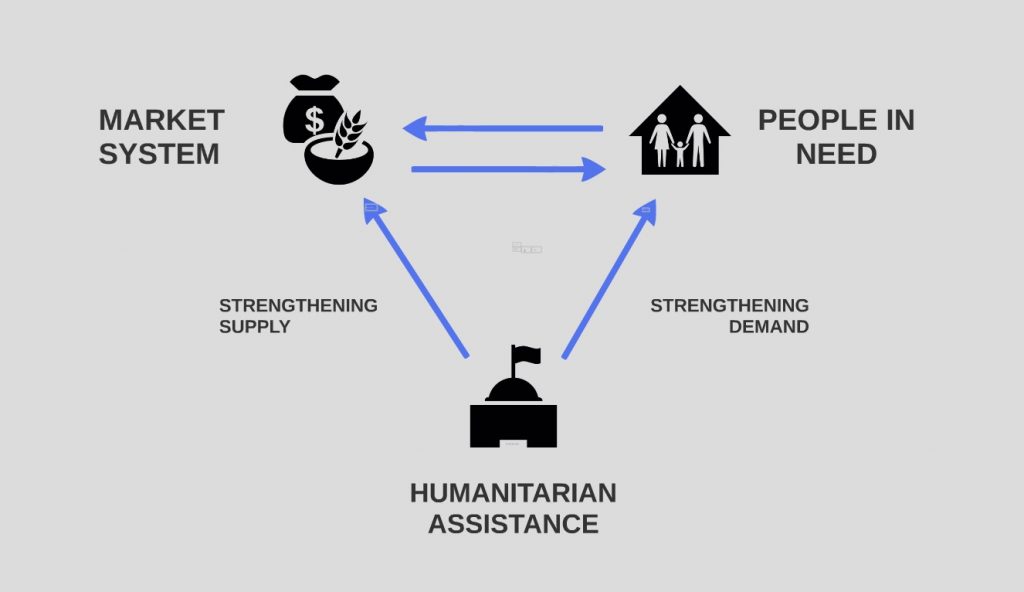
All programming should be informed by Market System and Needs Analysis
The need for the mainstreaming of a more systematic and WASH adapted approach to Market Analysis was identified, with the indication that the right resource model and depth for every context has to be found to not overstretch the burden of assessments, monitoring and evaluation. Also donors should be encouraged to shift funding to a more proactive use of analyses whilst not encouraging analysis fatigue. While ready-to-use tools for market analysis and assessments and a wide range of response options already exist, the sector is still lacking a robust evaluation and monitoring framework. The development of an M&E framework measuring impact, quality, cost efficiency and effectiveness of MBP/CTP was identified as a key prerequisite to enhance institutional understanding and support the compilation of a robust evidence base. To get these tools in practice the capacity gap needs to be addressed through the development of a WASH & Markets competency framework and capacity building formats.
We need to find the right levels of preparedness for MBP/CTP
The Stockholm events expressed the need to prove where? (context), when? (phase) and how? (modality) MBP and/or CTP allows people to adequately cover the WASH needs of affected populations. Due to missing standard operating procedures and low levels of preparedness and contingency planning the roll out of MBP/CTP at scale still takes long planning and preparation processes. For this reason it is still questionable, if MBP/CTP alone can guarantee an effective and timely response in the live saving needs / relief phase of an emergency. To improve guidance the development of a continuum matrix which should describe the applicability (incl. pre-requisites for the application) of MBP/CTP modalities in different context and phases of an emergency depending on the prior level of preparedness was discussed during the event. The proactive proliferation of Pre-Crisis Market Analysis (PCMA) is essential to inform not only potential emergency responses but also to improve preparedness, contingency planning, mitigation and disaster risk reduction. PCMA assess the ability of critical market systems to respond to shock events and scale up to meet rapidly growing demand post-crisis.
Navigating MBP/CTP in the Relief to Development Continuum
MBP’s inherent potential for early economic recovery has been identified as an opportunity, which requires a shift towards a more holistic approach to the phasing of programs. In particular Market Development (e.g. training of entrepreneurs, business development, microfinance etc.) takes time and needs streamlined funding for a smooth transition. The exchange between humanitarian and development actors should be fostered to identify synergies and make use of the development tools, skills and experiences. Development actors can encourage and support humanitarians in the development of governance programmes around MBP interventions.
How to ensure equitable access to WASH services for all
As part of the discussion manifold ethical and social questions arise: MBP/CTP modalities transfer risks and responsibilities to market systems and require new forms of partnerships and implementing structures with private sector on the ground. These actors work for profit and have no intrinsic incentive to ensure equitable access to WASH services for all. The Stockholm event posed the question how we can ensure that these actors commit to a human rights based approach the humanitarian principles of humanity, impartiality, neutrality and independence? Like traditional WASH programmes, MBP/CTP should be aware and informed about social implications of the intervention and potential distortion of local markets and capable to mitigate risks. Guidance, tools and mitigation strategies might be different and need to be adapted for WASH practitioners.
The results of the session can be summarized in the following 9 Key Recommendations:
| Key Recommendations |
| 1) The WASH sector should actively engage in the ‘global cash agenda’ and ensure that WASH-stakeholders and -expertise is adequately represented in relevant forums of humanitarian policy, in Cash Working Groups and coordination bodies on all levels. |
| 2) The Global WASH Cluster and its Technical Working Group on “WASH & Markets” (TWiG) should take an active leadership role to strengthen the WASH sectors understanding of and engagement with market-based approaches, as well as to explore and build evidence on markets-based approaches in WASH. |
| 3) All programming should be informed by systematic and WASH adapted Market System and Needs Analysis. The right resource model and depth for every context has to be found to not overstretch the burden of assessments, monitoring and evaluation. |
| 4) An M&E framework measuring impact, quality, cost efficiency and effectiveness of MBP/CTP should be developed. It is a key prerequisite to enhance institutional understanding and support the compilation of a robust evidence base. |
| 5) Market aware WASH capacities need to be build up. A WASH & Markets competency framework and new or adapted capacity building formats (e.g. trainings), which meet the specific requirements of WASH capacities, needs to be developed. |
| 6) Existing guidance should be complemented by a continuum matrix which should describe the applicability (incl. pre-requisites for the application) of MBP/CTP modalities in different context and phases of an emergency depending on the prior level of preparedness. |
| 7) The proactive proliferation of Pre-Crisis Market Analysis (PCMA) is essential to inform not only potential emergency responses but also to improve preparedness, contingency planning, mitigation and disaster risk reduction. |
| 8) In order to strengthen market recovery/development, governance programmes and the enabling environment of MBP/CTP the exchange between humanitarian and development actors should be fostered. Synergies of potential collaboration as well as useful development tools, skills and experiences need to be identified. |
| 9) MBP/CTP should be aware and informed about social implications of an intervention, peace and conflict as well as potential distortion of local markets and capable to mitigate risks. Guidance, tools and mitigation strategies need to be developed or adapted for WASH practitioners. |
DOWNLOAD LINK: Compilation of Speaker Slides (.pdf)
DOWNLOAD LINK: Presentations from the SuSanA WG Meeting (.zip)
- Katie Whitehouse / Oxfam GB
- Simone Klawitter / UNICEF
- Roland Wallusche Saul / CRS
“Opportunities of Market-Based Programming to Address Humanitarian WASH Needs”
Introduction
16:00 Welcome, Introduction and definitions
- Thilo Panzerbieter, Chariman of the German WASH Network
- The global push for multi-purpose cash assistance. Is cash the appropriate tool to meet WASH needs? Bärbel Kofler, Federal Governement of Germany
16:10 Lessons from Practitioners
- Promoting market-based responses to emergencies through WASH market mapping and analysis, Katie Whitehouse, Oxfam GB
- Use of economic incentives in a large scale humanitarian WASH response and potential market failure in the Philippines post Haiyan, Simone Klawitter, UNICEF
- Effectiveness and appropriateness of cash-based approach to deliver sanitation solutions in the in the Philippines post Yolanda, Rolando Wallusche Saul, Catholic Relief Service
16:30 Questions and answers
16:40 Current Status, Gaps and Challenges of Market-Based Programming the WASH Sector
- The WASH cluster perspective, Dominique Porteaud, Global WASH Cluster
- The donor perspective, Daniel Clauss, ECHO
- The development perspective, Dr. Ulrike Pokorski da Cunha, GIZ
16:40 Defining the Scope of Market-Based and Cash-Transfer Programming in the Humanitarian WASH Sector
- Fish Bowl Discussion with speakers and event participants
17:20 Conclusion und Closure
- Angela Siegmund, Auswärtiges Amt
- Thilo Panzerbieter, WASH Network
Find here the official programme of the event
Organizers of the Event
German WASH Network
Auswärtiges Amt
Deutsche Gesellschaft für Internationale Zusammenarbeit
European Commission’s Humanitarian Aid and Civil Protection department (ECHO)
Catholic Relif Service
Eidgenössisches Departement für auswärtige Angelegenheiten, Schweiz
Global WASH Cluster
Oxfam-Great Britain
United Nations International Children′s Emergency Fund (UNICEF)
Sustainable Sanitation Alliance (SuSanA)
Invited experts and speakers
Thilo Panzerbieter, German Toilet Organization (GTO)/ German WASH Network
Angela Siegmund, Auswärtiges Amt
Ajay Paul, Welthungerhilfe
Katie Whitehouse, Oxfam GB
Simone Klawitter, UNICEF
Rolando Wallusche Saul, Catholic Relief Service
Dominique Porteaud, Global WASH Cluster
Daniel Clauss, ECHO
Dr. Ulrike Pokorski da Cunha, GIZ
In collaboration with
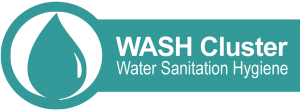

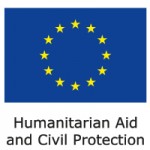




Supported by
